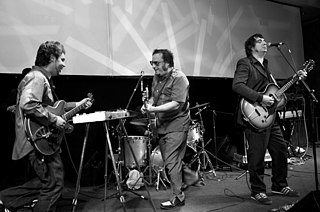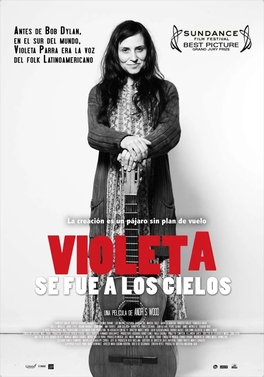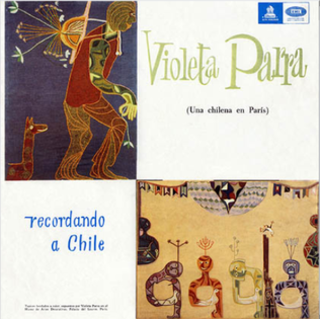
Los Tres also known as The Tr3s or The 3, is a Chilean rock band. Los Tres recorded nine albums from 1989 until 2000, starting with Los Tres in 1991. The band dissolved in 2000 and its members continued their musical careers. In February 2006 Alvaro Henríquez, Ángel Parra, and Roberto Lindl announced the reunion of the band without drummer Francisco Molina and the recording of their 2006 studio album Hágalo Usted Mismo.

Violeta del Carmen Parra Sandoval was a Chilean composer, singer-songwriter, folklorist, ethnomusicologist and visual artist. She pioneered the Nueva Canción Chilena, a renewal and a reinvention of Chilean folk music that would extend its sphere of influence outside Chile. Parra is acknowledged as "the Mother of Latin American folk".

X Vietnam or Por Vietnam is an album by Quilapayún released in 1968. This was among the first albums to be released under the DICAP label and was a success upon its release in Chile. The music and subject matter of the recording is very internationalist and was the first recording success of the Nueva Canción Chilena.
Luis Advis Vitaglich was a Chilean professor of philosophy, and a noted composer of traditional and New Chilean music. He was officially recognized as a Fundamental Figure of Chilean Music in 2003.

Víctor Jara (Geografía) is the name of the first studio album recorded by the Chilean folk-singer/songwriter, Víctor Jara in 1966 which was released by RCA (Demon) early in 1967.

Violeta Isabel Cereceda Parra, better known as Isabel Parra, is a famous Chilean singer-songwriter and interpreter of Latin American musical folklore.
Rafael Manríquez was a Chilean journalist, singer, guitarist, composer and producer born in Santiago.
"Gracias a la vida" is a song composed and first performed by Chilean musician Violeta Parra, one of the artists who set the basis for the movement known as Nueva Canción. Parra composed "Gracias a la vida" in La Paz in 1966, and the song was released on Las Últimas Composiciones, the last album Parra published before committing suicide in 1967. The song is one of Parra's most renowned and is performed throughout the world, and remains as one of the most covered Latin American songs in history. The song was inducted into the Latin Grammy Hall of Fame in 2013.

Violeta Went to Heaven is a 2011 Chilean biopic about singer and folklorist Violeta Parra, directed by Andrés Wood. The film is based on a biography by Ángel Parra, Violeta's son with Luis Cereceda Arenas. He collaborated on the film.
The Nueva Canción Chilena or "New Chilean Song” was a movement and genre of Chilean traditional and folk music incorporating strong political and social themes. The movement was to spread throughout Latin America during the 1960s and 1970s, in what is called "Nueva canción" sparking a renewal in traditional folk music and playing a key role in political movements in the region.
La Nueva Canción Chilena was the second album recorded in exile in Italy by Inti-Illimani in 1974. It's their first album known also with a progressive numeration linked with the band name, in this case Inti-Illimani 2.

Canto y guitarra, also known as El folklore de Chile, is an album by Violeta Parra released on the Odeón label in September 1957. It was the first full-length album by Parra. It was released after Parra's return from Europe where she traveled for two years.

El folklore de Chile Volumen 2, also known as Acompañándose en guitarra, is an album by Violeta Parra released on the Odeón label in 1958. It was the second full-length album by Parra. The album features Parra singing and accompanying herself on guitar. The album contains 16 songs, including songs collected in the countryside and original compositions.

Tonadas, also known as La tonada presentada por Violeta Parra and El folklore de Chile Volumen 4, is an album by Violeta Parra released on the Odeón label in September 1959. It was the fourth full-length album by Parra and part of Odeón's "El folclore de Chile" series to which Parra contributed five albums. The album contains 15 songs in the tonada genre. The album consists mainly of songs collected in 1959 in the central zone of the Chilean countryside.

Toda Violeta Parra: El folklore de Chile Vol. VIII is an album by Violeta Parra released on the Odeón label in late 1961. It was the fifth full-length album by Parra and part of Odeón's "El folclore de Chile" series to which Parra contributed five albums. The album contains 14 songs collecting Parra's work as a folk songwriter at different stages of her career. The album was Parra's first to explore issues of social justice and includes three tracks in which she set to music poems of Nicanor Parra and Pablo Neruda.

Chants et Danses du Chili II is an extended play record by Violeta Parra released on the Le Chant du Monde label in November 1956. It was the Parra's second extended play record. The release contains eight songs recorded in Paris on March 26, 1956, at the same session that resulted in "Chants et Danses du Chili I, released two months earlier. Parra toured Europe in 1955 after winning the Caupolicán prize in 1954.

El folklore de Chile según Violeta Parra,, also known as Violeta Parra en Argentina, is an album by Violeta Parra released on the Odeón label in June or July 1962. It was recorded at the Odeón studios in Buenos Aires between April 23 and May 4, 1962. Parra lived in Argentina from the spring of 1961 until the fall of 1962. The album contains 14 songs, including traditional Chilean folk songs and original compositions by Parra.

Recordando a Chile, also known as Una Chilena en París, is an album from Violeta Parra released on the EMI Odeón label (LDC-36533) in the summer of 1965. It was recorded during Parra's stay in Santiago between August 14 and October 21, 1964, and after her return from Europe in approximately August 1965. Tracks 2, 3, 5, 6, 10, and 11 were recorded in stereo and are believed to be from the 1965 sessions. The album cover features artwork by Violeta Parra.

"La Jardinera" is a song in the tonada genre written and performed by Violeta Parra. The song was originally recorded by the Hermanas Parra and released on the Odeón label.

"Que Pena Siente el Alma" is a song written and performed by Violeta Parra released on the Odeón label (E-50040) in 1955.















